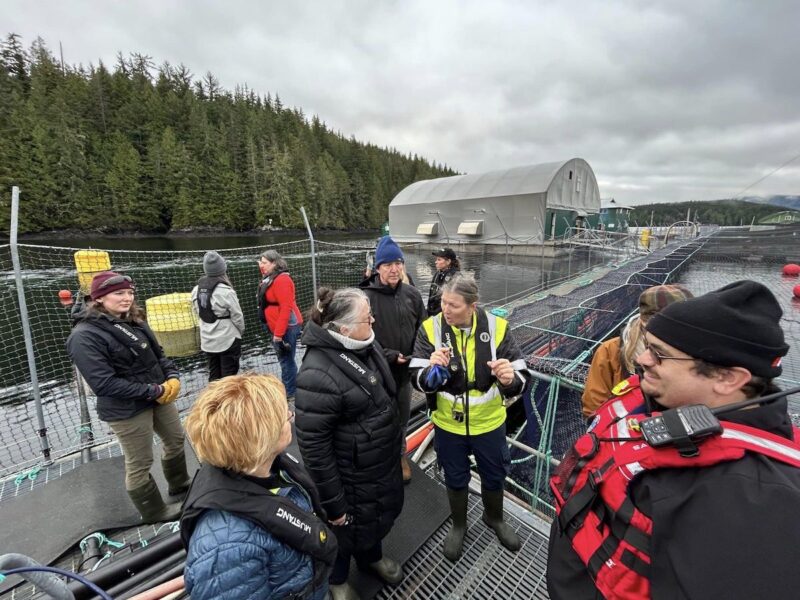Factually incorrect anti-salmon farming ads removed, again
The continued spread of misinformation by anti-salmon farming groups emphasizes the need for responsible advocacy based on facts and science.
By Fabian Dawson
SeaWestNews
Anti-salmon farming activists in British Columbia, who have a history of spreading falsehoods about aquaculture in Canada, have had their ‘factually incorrect’ radio ads removed from the airwaves.
The ads by the anti-fish farming group Wild First claimed that wild Pacific salmon are “on the brink of extinction” and called for the removal of ocean salmon farms to protect wild Pacific salmon.
This sensationalist claim is false, with recent research and peer-reviewed studies confirming a record-high abundance of wild Pacific salmon in the ocean since recorded history, said the BC Salmon Farmers Association (BCSFA) in a statement.
“False advertisements by Wild First mislead the public, particularly consumers who rely on accurate information to make informed choices about their food,” says Brian Kingzett, Executive Director of the BCSFA.
“The spread of this misinformation undermines the significant contributions salmon farming provides to our communities, economy, and environment and is unfair to the hardworking professionals who contribute to this sector,” he said.
“The continued spread of misinformation by Wild First and other anti-salmon farming organizations emphasizes the need for responsible advocacy based on facts and science,” said Kingzett.
“We commend Pattison Media for their commitment to promoting accurate information and ensuring that false advertising is promptly removed.
“The BCSFA continues to stand firm against the spread of falsehoods and remains committed to promoting factual discourse surrounding the salmon farming industry and its impact on the environment.”
This is not the first time Wild First advertisements have been removed due to the propagation of false information.
SeaWestNews reported in December, that Wild First billboards around Ottawa were removed.
The billboards by the activists were aimed to influence federal politicians to stop salmon farming on Canada’s West Coast, even as government scientific findings and court rulings have determined the marine aquaculture operations pose less than a minimal risk to wild fish stocks.
“In an age of misinformation, we are pleased that the right thing happened – false ads that did not stand up to the truth test were removed,” said Tim Kennedy, President and CEO of the Canadian Aquaculture Industry Alliance (CAIA).
“Activists with deep pockets who don’t live or work where our salmon farmers live and work are trying to drive policy decisions in Ottawa that would cancel people’s livelihoods using a storyline based on old data and false information,” he said.
The false statements on the billboards included claims from eco-activist group Wild First that “open-net pen salmon farms are banned in Washington, Oregon, California, and Alaska.”
“These anti-salmon billboards included statements by the activist group Wild First that were both false and potentially economically harmful to British Columbia businesses and organizations and their employees that the Canadian Aquaculture Industry Alliance represents,” said Kennedy.
Last summer, the activists used the world-wide abundance of Pink Salmon to push false narratives that the high returns – also recorded in British Columbia – are due to closures of open-net aquaculture operations on Canada’s west coast.
Cherry-picking data to confuse the public and hog the headlines, the activists ignored the fact that Pink Salmon runs were booming everywhere regardless of whether salmon farms are active or not.
This resulted in a TV station having to remove a news segment that contained numerous false claims by an anti-salmon farming campaigner.
Anti-salmon farming activists, who have been collecting public donations for their campaign of disinformation, have recently ratcheted up their efforts as the Federal Government works with the industry, First Nations and other stakeholders to come up with a transition plan for the industry.
The plan will impact 79 open-net farms in BC, which have been licensed to operate till next June, and about 5,000 jobs.
About 40 per cent of the British Columbia’s in-ocean salmon farming sector has already been closed, despite government scientists and court rulings stating that the salmon farms pose less than a minimal risk to wild stocks.
There are now several legal challenges mounted by First Nations, aquaculture service and supply companies, and salmon farmers, over the decisions to shut down fish farms in the Discovery Islands.
The Coalition of First Nations for Finfish Stewardship (FNFFS), which is urging Ottawa to renew the salmon farming licences for a period of nine years, said the future of modern salmon farming in BC must be shaped by the coastal First Nations.
“Our coalition is opposed to the federal government disregarding science and bowing to unfounded activist claims on salmon farming that, if heeded, will severely damage our communities, and deny our rights and title,” the Coalition has said.
Seventeen First Nations have a variety of agreements and business arrangements with finfish aquaculture companies in BC with the longest going back over two decades. These 17 Nations make up much of the south coast of British Columbia, with supply lines in the Fraser Valley, processing plants on the Lower Mainland, and transport contracts across the province, the coalition said. All salmon farmed in British Columbia falls under a beneficial partnership with a First Nation.
Image courtesy of BCSFA shows Federal Fisheries Minister Diane Lebouthillier (centre) with aquaculture workers at a fish farm during her visit to BC last December.

